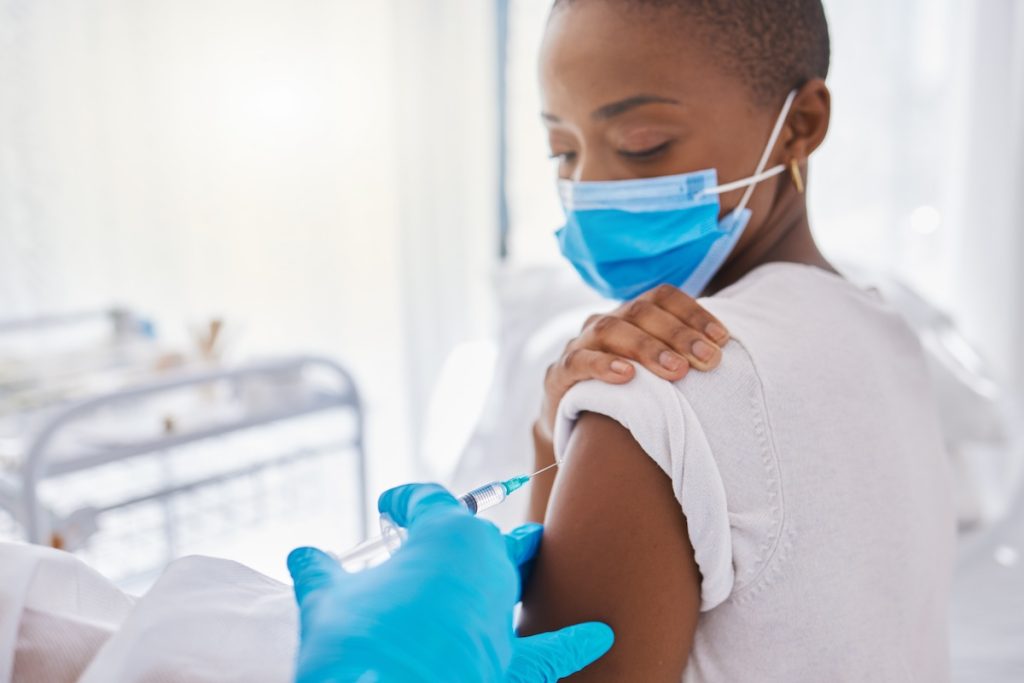Did you know that 95% of people hospitalized by COVID-19 last year weren’t up to date on their vaccines? As we move into late 2024, COVID-19 remains a part of our lives. But the virus the virus has evolved, and so have we. With new variants and updated vaccines, staying informed is vital. Whether you are a senior citizen, immunocompromised, an infant, or concerned about the safety of your loved ones, we’ve got you covered. We talked to Drs. Namandjé N. Bumpus, a Principal Deputy Commissioner of the FDA, and. Nirav D. Shah, a Principal Deputy Director at the CDC, about the current state of COVID-19, and here’s what you need to know right now.
BHM: Can you explain the current state of COVID-19 in the United States?
Dr. Bumpus & Dr. Shah: As of September 13, 2024, COVID-19 activity remains elevated nationally, but there are continued signs of decline in many areas. Positive tests for COVID-19, emergency department visits, and rates of COVID–19–associated hospitalizations remain high as well, particularly among adults 65+ and children under two years old.
There are many effective tools to prevent the spreading of COVID-19 or becoming seriously ill. This season’s COVID-19 vaccines are available and provide the best protection against severe disease.
BHM: What are the characteristics of the latest COVID-19 variants? How do these strains differ from previous variants regarding transmissibility and severity?
Dr. Bumpus & Dr. Shah: KP.3.1.1, of the Omicron family, is now the predominant SARS-CoV-2 variant circulating in the United States, having overtaken its parent lineage KP.3 and previous KP.2 variants. KP.3.1.1 is the only major variant increasing in proportion nationally.
Like many of the more recent variants, the current COVID-19 virus variants are very contagious.
Overall, infections with the virus that causes COVID-19 have become less severe as immunity from vaccines and previous infections provide greater protection. However, COVID-19 remains a cause of long COVID, severe illness, and death, especially for people at higher risk.
BHM: What are the most common symptoms associated with the new variants?
Dr. Bumpus & Dr. Shah: The current COVID-19 variants have symptoms similar to those of previous variants. The most common symptoms include fever or chills, cough, sore throat, a stuffy or runny nose, loss of taste or smell, fatigue, body aches, headache, nausea, vomiting, and diarrhea.
BHM: How effective are the updated 2024-2025 COVID-19 vaccines against the new variants?
Dr. Bumpus & Dr. Shah: Based on data from past seasons, vaccines effectively lower the risk of getting very sick or hospitalized with COVID-19 illness by about half. The COVID-19 virus changes yearly, which is one reason why vaccines need to be updated to target the latest and most common variant(s).
The protection against severe illness offered by COVID-19 vaccines weakens over time, so the CDC strongly urges everyone 6 months and older to stay up to date with their COVID-19 vaccination.
BHM: How safe are the new vaccines, especially for children and immunocompromised individuals?
Dr. Bumpus & Dr. Shah: COVID-19 vaccines have undergone the most extensive safety analysis in U.S. history. The updated vaccines for this year have a similar safety profile to past years. Most side effects are mild to moderate and go away on their own in a few days. The most common side effects of COVID-19 vaccines are soreness or red skin where you got the shot, tiredness, fever, body aches, and headache. Severe side effects are rare.
Of every 1 million doses of COVID-19 vaccines given, five cases of anaphylaxis, a severe allergic reaction, are reported.
People are sometimes asked to wait 15 minutes before leaving their vaccine provider so they can be treated if they have a severe reaction. There is no evidence that vaccines cause or worsen chronic conditions. Young children, older adults, and people with weakened immune systems are at higher risk of getting very sick from COVID-19. If they get an updated COVID-19 vaccine, they are much less likely to need to see a doctor or go to the hospital. If you have questions or concerns about whether an updated COVID-19 vaccine is right for you or your family, talk to your doctor.
BHM: What are the recommendations for people recently recovering from COVID-19 regarding receiving the latest vaccine?
Dr. Bumpus & Dr. Shah: If you’ve recently had COVID-19, you can wait up to 3 months to get a COVID-19 vaccine. The risk of getting COVID-19 again is lower after you’ve had it. Immunity from having had COVID-19 weakens over time, as does immunity from COVID-19 vaccines. That is another reason why getting updated COVID-19 vaccines as they become available is essential.
BHM: Given the recent surge in cases, what are the current CDC guidelines for COVID-19 prevention, quarantining, and safety?
Dr. Bumpus & Dr. Shah: The updated COVID-19 vaccine remains our best protection against severe disease. The updated Respiratory Virus Guidance recommends that people stay home and away from others until at least 24 hours after their symptoms improve overall and they have not had a fever (and are not using fever-reducing medication). Note that depending on the length of symptoms, this period could be shorter, the same, or longer than the previous guidance for COVID-19.
In addition, the CDC recommends that everyone use core prevention strategies, such as practicing good hygiene (practices that improve cleanliness) and taking steps to ensure cleaner air.
You can also choose additional prevention strategies to protect yourself further, such as masks, physical distancing, and tests. Treatment for a respiratory virus may help lower your risk of severe illness.
If someone with COVID-19 is showing any of these signs, call 911 or call ahead to your local emergency facility: trouble breathing, persistent pressure or pain in your chest, new confusion, inability to wake or stay awake, and (depending on skin tone) lips, nail beds, or skin that appears pale, gray, or blue.
